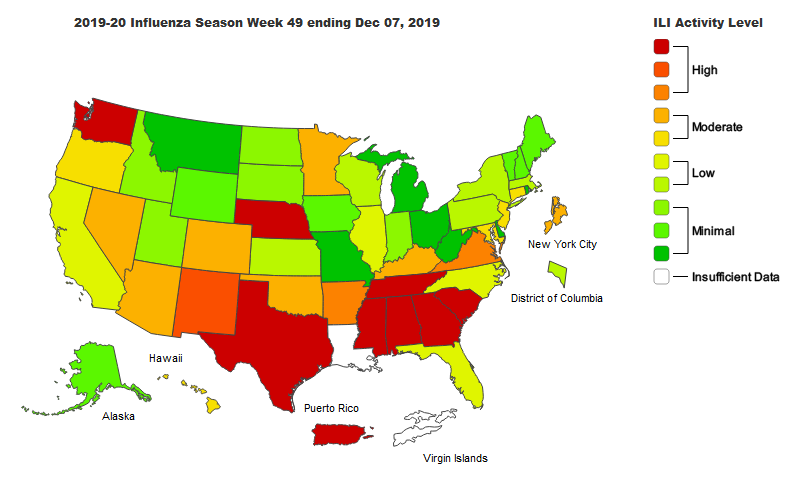Pig 3.0, the air out there, Miss America, and more
21 Dec 2019
Posted by Andrew Kantor
Big news for Americans
Look at the person on your left. Look at yourself. According to researchers from Harvard and GWU, one of you has a lot to look forward to.

And you’ll be making climate change worse, too.
People with obesity have greater carbon dioxide production from oxidative metabolism than individuals with normal weight. Also, maintenance of greater body weights requires more food and drinks to be produced and transported to the consumers. Similarly, transportation of heavier people is associated with increased consumption of fossil fuels.
Ebola vaccine
The FDA has approved the first Ebola vaccine: Merck’s Ervebo. It was tested in the Democratic Republic of the Congo* for two years, and obviously it works.
* As opposed to its neighbor, the Republic of the Congo
Quick illness updates
Mysterious vaping illness: 2,506 hospitalizations, 54 dead. (Reuters)
Flu: 2.6 million flu illnesses so far this year, 23,000 hospitalizations, and 1,300 dead. Georgia is one of 11 states (plus Puerto Rico) with the highest level of activity. (CDC)

When in doubt, caffeinate
Let’s say you have some fat rats — you know, the ones on an “obesogenic diet.” How can you keep them healthy? The answer, as it often is, is more caffeine.
Rats that consumed the caffeine extracted from mate tea gained 16% less weight and accumulated 22% less body fat than rats that consumed decaffeinated mate tea, scientists at the University of Illinois found in a new study. The effects were similar with synthetic caffeine and that extracted from coffee.
* That sounds so much better than the alternatives.
Bill to lower insulin prices
The co-chairs of the Congressional Diabetes Caucus have announced a bill to reduce insulin prices. And we love the name: “the Insulin Price Reduction Act.”
Simply put, “in exchange for lowering the price of their insulin products back to their 2006 list prices,” insulin makers would be guaranteed their products would be covered by insurance companies — no rebates necessary. The idea: People with insurance would see lower co-pays, and people without it could be able to afford the drug.
Pig 3.0
No, really, that’s what they call it: Pig3.0. It’s a pig with genes that have been CRISPR-tweaked to prevent its organs from being rejected by humans. If successful, pigs like this could significantly reduce the need for donated organs.
The resulting pigs appeared healthy and fertile with functioning organs, the team reports today. And initial tests of their cells in lab dishes suggest that their organs will be much less prone to immune rejection than those of unmodified pigs.
Next up: tests on non-human primates.
Sonny, move out to the country
Pregnant? Living around traffic and the pollution it causes can increase your risk of hypertension — and the problems it brings to a pregnancy.
[N]itrogen oxides, carbon monoxide, black carbon, and elemental carbon, along with parameters like traffic density and mothers’ proximity to main roads […] the literature suggests that women who live within a quarter of a mile of a major roadway or in high traffic density regions may be at an increased risk for developing hypertensive disorders of pregnancy.
The health benefits of getting away from pollution is just about instantaneous, too.
Student pharmacist named Miss America
We’re not quite sure how we feel about this, but still — congrats to Camille Schrier.
Schrier […] is a graduate student at Virginia Commonwealth University who is pursuing a doctor of pharmacy degree. In 2018, she graduated cum laude from Virginia Tech with degrees in biochemistry and systems biology.


